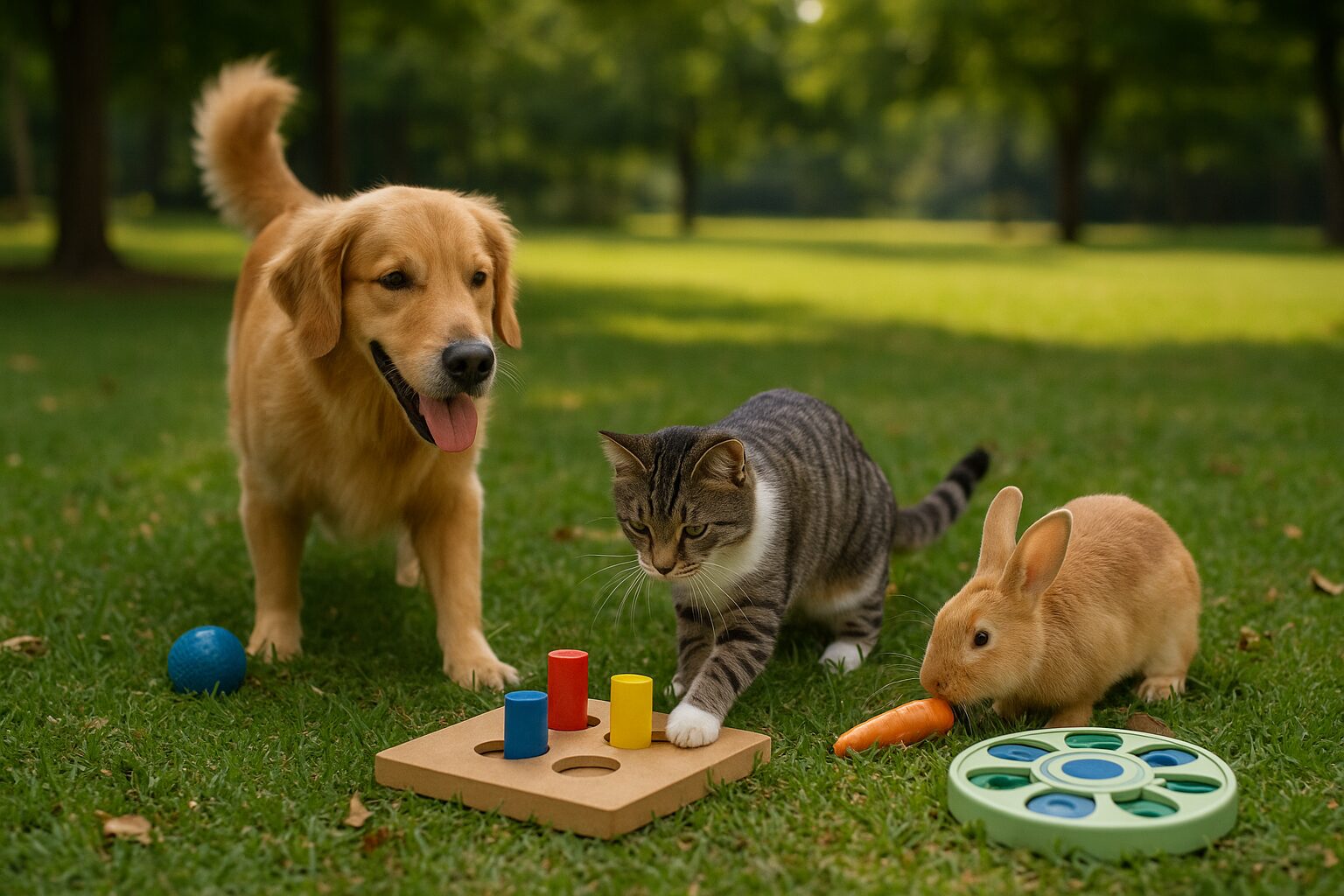
Animal enrichment
The Importance of Animal Enrichment Through Mental and Physical Exercise for Pets
Pets are more than companions; they are living, sentient beings with emotional, cognitive, and physical needs that require attention. While food, shelter, and medical care provide the foundations for their well-being, mental and physical enrichment are equally vital for a pet’s long-term health and happiness. Enrichment through exercise—both physical and cognitive—helps prevent behavioural issues, fosters stronger human-animal bonds, supports physical health, and enhances overall quality of life. Without it, pets are at risk of developing not only physical ailments but also mental stress, anxiety, and destructive behaviours.
Animal enrichment day is a day to raise awareness of the importance of both mental and physical stimulation.
Physical Health and Longevity
Animal enrichment cannot be achieved without regular physical exercise to keep pets strong, agile, and at a healthy weight. Just like in humans, a sedentary lifestyle can lead to obesity in animals, which in turn increases the risk of heart disease, diabetes, arthritis, and shortened lifespans. Dogs, for example, benefit from daily walks, runs, or play sessions that keep their muscles toned and joints flexible. Cats, although often perceived as more independent, also need exercise to prevent weight gain and maintain lean muscle. Engaging them with toys that encourage chasing, pouncing, or climbing stimulates their natural predatory instincts while burning calories.
Beyond weight management, physical activity helps with circulation, digestion, and even immune system strength. For pets bred for working roles—such as herding dogs, hunting dogs, or active breeds like huskies and border collies—exercise is not just beneficial but essential. Their bodies are adapted to high levels of activity, and without adequate outlets, they can develop restlessness or health complications.
Mental Stimulation and Cognitive Health
Mental stimulation is an important part of animal enrichment. While physical exercise keeps the body healthy, mental enrichment keeps the mind sharp. Animals are naturally curious and problem-solving creatures. Dogs sniffing out scents, cats stalking prey, or birds foraging for food are examples of behaviours rooted in their instincts. Providing mental enrichment through puzzle toys, training sessions, scent games, or environmental variety allows pets to exercise their cognitive skills.
Mental stimulation is especially important in preventing boredom. Pets without adequate stimulation may turn to destructive or undesirable behaviours such as chewing furniture, excessive barking, scratching walls, or self-harming behaviours like over-grooming. These actions are not signs of “bad” pets but rather symptoms of unmet needs. By giving them challenges that engage their brains, owners can reduce frustration and channel their pets’ energy in healthy, constructive ways.
For senior pets, mental enrichment has another crucial role: slowing cognitive decline. Just as humans benefit from brain games to reduce the risk of dementia, older dogs and cats can maintain better memory, focus, and problem-solving abilities through ongoing mental challenges. Even small tasks, such as learning a new trick or searching for hidden treats, help keep aging minds active.

Behavioural Balance and Stress Reduction
Animal enrichment through exercise is also closely tied to emotional well-being. Pets without enough outlets for their energy can become anxious, stressed, or hyperactive. For dogs, lack of exercise often results in excessive barking, leash pulling, or difficulty calming down indoors. Cats may show stress through inappropriate scratching or elimination outside the litter box. These behaviours often strain relationships between pets and their owners, sometimes leading to abandonment or rehoming.
By ensuring pets receive proper exercise and enrichment, owners can prevent such issues before they arise. A tired pet is usually a content pet. After a stimulating walk or play session, animals are more likely to rest calmly, show affection, and adapt to household routines. Exercise also helps regulate sleep cycles and reduces stress hormones, fostering calmer and more balanced temperaments.
Strengthening the Human-Animal Bond
Engaging in exercise and enrichment with pets builds trust and deepens the relationship between humans and animals. Training a dog to perform tricks, playing fetch, or setting up an obstacle course not only provides stimulation but also creates moments of communication and connection. Cats, though often stereotyped as aloof, thrive on interactive play with their humans, such as using feather wands or laser pointers. Birds, rabbits, and even reptiles benefit from activities that involve owner interaction, reinforcing trust and companionship.
When pets feel understood and engaged, they are more responsive and affectionate toward their caregivers. The shared activities become mutual experiences of joy and fulfilment, strengthening the emotional bond that makes pet ownership so rewarding.

Enhancing Quality of Life
Ultimately, the combination of physical and mental enrichment ensures pets live lives that are not only longer but also more fulfilling. Enrichment respects an animal’s natural instincts—whether it be hunting, digging, climbing, chewing, or problem-solving—and provides them with appropriate outlets. In modern domestic environments, where animals no longer hunt for food or roam freely, enrichment serves as a replacement for the challenges they would naturally encounter in the wild.
A pet’s quality of life is measured not only by freedom from suffering but also by opportunities to thrive. Enrichment gives them purpose, variety, and enjoyment, transforming routine days into stimulating experiences. This translates into happier, healthier, and more balanced companions who can integrate seamlessly into their human households.
Conclusion
Animal enrichment is good!
Mental and physical animal enrichment for pets is not an optional luxury but a fundamental aspect of responsible ownership. By providing regular exercise, mental challenges, and interactive play, owners support their pets’ health, reduce behavioural problems, strengthen bonds, and enhance overall well-being. Neglecting animal enrichment risks physical illness, mental stagnation, and emotional distress. Conversely, pets who receive enrichment are healthier, happier, and more harmonious members of their families. In the end, enrichment is not just about keeping pets busy—it is about honouring their needs as living beings and giving them the best possible life.
Get in touch with us if you would like to talk to us about how to keep your pet active.
